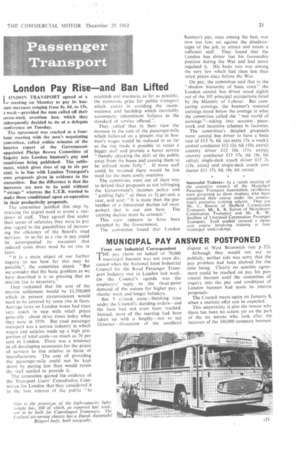London Pay Rise and Ban Lifted
Page 23

If you've noticed an error in this article please click here to report it so we can fix it.
ON DON TRANSPORT agreed at a meeting on Monday to pay its busmen increases ranging from Ss. 6d. to 15s. week—provided the men called off their seven-week overtime ban, which they subsequently decided to do at a delegate conference on Tuesday.
The agreement was reached at a fourhour meeting with the men's negotiating committee, called within minutes of the interim report of the Governmentappointed Phelps Brown Committee of Inquiry into London busmen's pay and conditions being published. The settlement, which gives rises of up to six per cent, is in line with London Transport's own proposals given in evidence. to the committee. But the difference is that the increases are now to be paid without " strings " whereas the L.T.B. wanted to make them conditional upon co-operation in their productivity proposals.
The committee justified this step by stressing the urgent need to arrest a rundown of staff. They agreed that under their terms of reference they were to pay due regard to the possibilities of increasing the efficiency of the Board's road services. In so far as a rise in pay could be accompanied by measures that reduced costs there need be no rise in fares.
"it is a main object of our further inquiry to see how far this may be possible", the committee stated. "But we consider that the basic problem as we have described it is so pressing that an interim rise is necessary."
They reckoned that the cost of the interim settlement would be £1,350,000 which in present circumstances would need to he covered by some rise in fares. Average fares on London buses had risen very much in step with retail prices generally -about three times today what they were in 1939. But road passenger transport was a service industry in which wages and salaries made up a high proportion of total costs—as much as 70 per cent in London. There was a tendency in all developing economies for the prices of services to rise relative to those of manufacturers. The cost of providing the passenger-mile could not be kept down by paying less than would retain the staff needed to provide it.
The committee quoted the evidence of the Transport Users' Consultative Committee for London that they considered it in the best interest of the public " to establish and maintain, as far as possible, the economic price for public transport which assists in avoiding the inconvenience and hardship which inevitably accompany intermittent failures in the standard of service offered ".
They added that in their view the increase in the cost of the passenger-mile which followed on a present rise in busmen's wages would be reduced in so far as the rise made it possible to retain a bigger staff and provide a better service " thereby checking the drift of the public away from the buses and causing them to be utilized more fully ". If more staff could be retained there would be less need for the more costly overtime.
The committee went out of their way to defend their proposals as not infringing the Government's incomes policy and "guiding light" of three to 3+ per cent a year, and said: "It is more than the prevention of a threatened decline (of manpower) that is our aim here. The existing decline must be arrested."
This view appears to have been accepted by the Government.
The committee found that London busmen's pay, once among the best, was now too low, set against the disadvantages of the job, to attract and retain a sufficient staff. They found that the London bus driver lost his favourable position during the War and had never regained it. His basic rate was among the very few which had risen less than retail prices since before the War.
On pay, the committee said that in the 'shadow hierarchy of basic rates" the London central bus driver stood eighth out of the 105 principal occupations listed by the Ministry of Labour. But comparing earnings, the busmen's rostered earnings stood below the average in what the committee called the "real world of earnings"—taking into account. piecework and incentive schemes in factories.
The committee's detailed proposals were: central bus driver to have a basic rate of £13 7s. hd. (an extra 15s. a week); central conductor £12 12s. 6d. (10s. extra); country driver £12 10s. (11s. extra): country conductor £11 17s. 6d. (8s. 6d. extra); single-deck coach driver £13 '2s. (13s. extra) and single-deck coach conductor £11 17s. 6d. (8s. 6d. extra).
Successful Trainees : At a recent meeting of the executive council of the Municipal Passenger Transport Association, certificates were presented to three students who have completed their course under the association's executive training scheme. They are Mr. C. Brewin of Sheffield Corporation Transport, Mr. IC_ R. Sutton of Manchester Corporation Transport and Mr. K. W. Swallow of Liverpool Corporation Passenger Transport. Each student covered a threeyear course involving training at four municipal undertakings.




























































































